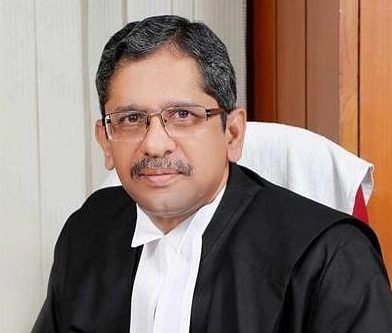Chief Justice of India NV Ramana hit the bull’s eye August 8 when he came down heavily on the incidence of custodial torture and other atrocities committed regularly in police stations across the country. He termed the barbarity as a “threat to human rights and bodily integrity,” saying human rights and bodily integrity are ‘sacrosanct’. The remarks were made at an event organised by the National Legal Services Authority (NLSA). A couple of days back, heading a two-judge bench, the CJI had castigated the two top Central investigating agencies – CBI and IB – for “not helping the judiciary at all” in matters relating to security of judges. The CBI and the police, he categorically said, don’t respond to complaints from judges.
His observations are a sad commentary on the crime and punishment scenario of the country. He pointed out there are several cases in the country in which gangsters and high profile people are accused and judges are sometimes threatened physically and mentally through messages on WhatsApp and SMS or harassed through social media posts. The CJI’s observation is a reminder of the death of Justice Loya some years ago and recently the Additional District and Sessions Judge Uttam Anand in Dhanbad July 28 under mysterious circumstances. ADJ Anand was killed after being hit by an auto-rickshaw when he was on morning walk. The murder of Judge Loya had deep shades of political interests and interference.
Things have come to such a pass that the CJI had to tell Attorney General KK Venugopal, who had been asked by the court to assist in the matter, that in some places the courts ordered CBI inquiry, but the agency did nothing. The CJI bemoaned a new trend has started in the country to malign the judiciary when adverse orders are passed and the CBI doesn’t respond. The apex court squarely held the state responsible for the death of the young judge in Dhanbad as the area is known to be a virtual fiefdom of the ‘coal mafia’. A curious plea was made by Jharkhand Advocate General Rajiv Ranjan who said the state had enhanced security for judges and built boundary walls where none existed. At this, Justice Surya Kant exposed the naive assertion of the Advocate General with the observation that boundary walls are no barriers for hardened criminals.
While delay in justice delivery has damaged the image of the judiciary, the executive too is being faulted for not responding to judicial requirements. If the judiciary is cowed down by criminals with political nexus, one can well imagine the plight of the common man.
The CJI’s observations regarding human rights violations by the police bring to light incidents like the death of a fruit stall owner, 47-year-old A Murugesan, allegedly due to brutal thrashing by a special sub-inspector of Tamil Nadu police in Vazhapadi in Salem district June 22. Two other policemen watched the crime by their colleague, while Murugesan’s friends pleaded for him to be spared. But, the SSI didn’t relent. Such cases are galore and the National Crime Records Bureau (NCRB) reeks of sickening tales of police brutality across all states.
Union Home Minister Amit Shah took a curious position July 12 when he rather helplessly pleaded at a programme in Ahmedabad that the police in the country are accused of either ‘no action’ or ‘extreme action’. Official statistics, whatever available, show the matter can’t be glossed over with such casual remarks. According to the NCRB, 85 cases of custodial deaths were reported in 2019 with Tamil Nadu registering the highest number of such cases followed by Gujarat, Punjab, Rajasthan and Odisha. No policeman was convicted, though 14 personnel of Gujarat were arrested and charge-sheeted. For six custodial deaths in Rajasthan, three magisterial inquiries and two judicial inquiries were initiated against erring policemen. In Odisha the police personnel involved in violations of human rights went scot free.
The grim reality is that though several policemen do get convicted, many are believed to get away by manipulating records, intimidating complainants or enjoying patronage from their higher-ups. Those police personnel who passively watch custodial torture taking place in their presence should be held equally guilty. Senior officers are expected to ensure that prompt actions are taken against policemen resorting to brutal torture. However, that is never happening. Once if such a message is sent loud and clear that the erring personnel would be promptly punished, the system can be cleansed. But, what the police lack most is a regular sensitisation and refresher course which should be made an indelible part of the job. Interaction with senior officers and socially prominent citizens from different walks of life on a regular basis would heighten the sense and sensibilities of the cop on the street. That is never done by the Indian police. The system still functions as a machine of colonial repression. That atmosphere makes police personnel suspicious of every citizen. Since heinous crimes committed by policemen go totally unpunished, it is imperative that police personnel realise they are not above the law and that their salary, however unimportant for them, is paid for by the taxpayer.
